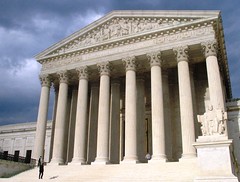We retired Tax Justice Blog in April 2017. For new content on issues related to tax justice, go to www.justtaxesblog.org
This week, the Supreme Court declined to hear the e-commerce industry’s challenge to New York’s trend-setting “Amazon law.” The law, which was upheld by New York’s highest court, successfully expanded the number of online retailers collecting New York sales taxes. It did this by requiring any e-retailer to collect the tax if they partner with New York based “affiliates” to generate over $10,000 in sales. Because of the law, Amazon.com has been collecting sales taxes from its New York customers for more than 5 years, generating millions in revenue for public services and making the state’s sales tax base slightly more rational. 
In the wake of the Court’s refusal to hear Amazon.com and Overstock.com’s appeals, some observers are already predicting that more states will be tempted to follow New York’s lead. And follow it they should. More than a dozen states have “Amazon laws” patterned after New York’s and while they’re not a panacea for the tax base erosion that online shopping has caused, they are the best option states have available to them right now.
If anybody needs to pay attention to the Court’s ruling, though, it’s the U.S. House of Representatives. Almost seven months ago the Senate passed a bipartisan bill that would have made New York’s law irrelevant by empowering all states to apply their sales tax collection laws more broadly to all e-retailers above a certain size. The bill has widespread support among traditional retailers and a broad coalition of state-level lawmakers, but has so far been stopped—like many other reforms—by the House’s aversion to virtually anything that would improve tax collections at any level of government.